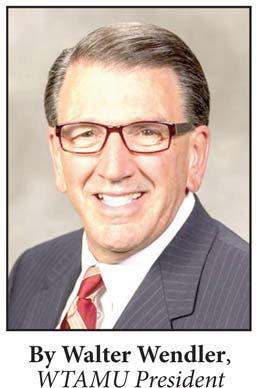Large organizations can exploit size to create an economy of scale. It is, singularly, the best argument for bigness.
This may be true when making automobiles, electric coffee pots, shoes or growing corn or wheat. In human service organizations, and that is what a university is, individually tailored attention to the distinctiveness of every student, big can create problems. Big can lead to bureaucracy. WT is betting its future on a performance culture.
Eugene McCarthy was quoted in Time Magazine with this thought, “The only thing that saves us from the bureaucracy is inefficiency. An efficient bureaucracy is the greatest threat to liberty.”
Processes do not create intellectual liberty, student aspirations and engaged citizenship, but liberty flourishes when people relate to each other one at a time. So, it should be in an effective university.
Large bureaucratic organizations tend to lack agility. They operate by cannon and code, rules and regulations, spread over multiple layers of management and decision-making, which can lead to slow and ineffective decision-making.
And in an organization that purposefully wants to treat each individual as unique and distinctive flexibility is required. If policy leads to rigidity, individual students are squeezed to fit perceived organizational needs rather than having the organization adapt itself to meeting the needs of individual students. Human effectiveness evaporates.
Big ideas that influence actions in our lives are what makes organizations thrive. Dignified individuals working together lead to this outcome. Rules without relationships are impediments.
Add to the trappings of idealization, brought about by the adherence to protocols, processes, and eventually, the status quo, discourage people in service to people from trying new ideas. In addition, communication in a large organization is challenging. Hannah Arendt posited it this way: In every bureaucratic system the shifting of responsibilities is a matter of daily routine, and if one wishes to define bureaucracy in terms of political science, that is, as a form of government--the rule of offices, as contrasted to the rule of men, of one man, or of the few, or of the many-bureaucracy unhappily is the rule of nobody and for this very reason perhaps the least human and most cruel form of rulership.
People create progress in every organization. That progress is the result of applied ideas. This is especially the case at universities founded on their responsiveness to aspirational dreams and the encouragement of purposeful individuality.
Hierarchical structures can create barriers between different areas within the organization. This is true even in the smallest organizations, such as a marriage. It is the hope of leaders in large organizations, even a midsized University like WT, that with effort, clear, consistent communication will create a sense of purpose and a means to achieve it. And institutional responsibility at a place like WT is to create freedom of thought.
Walter Bagehot, in Literary Studies, suggested that process impacted the freeing of the energies of humanity: “A bureaucracy is sure to think that its duty is to augment official power, official business, or official members, rather than to leave free the energies of mankind; it overdoes the quantity of government, as well as impairs its quality.”
Freedom, and free thought, ultimately the destination of the American experiment, are enhanced in organizations that thrive on fundamental ideas shared by all: Communication.
The elixir to bureaucratic organizations, the medication that will address the pain and suffering of calcification, the remedy in a wall suffocating with rules, processes, rubrics and various requirements, is common sense.
At WT, we endeavor to treat everyone with dignity and respect in response to deep principles of fairness and equanimity guided by the simple postulate that common sense applied to helping people achieve their aspirations is a high calling, the responsibility of a university and the expectation of every student, faculty, staff and visitor to our campus.
It is the way of West Texas.

